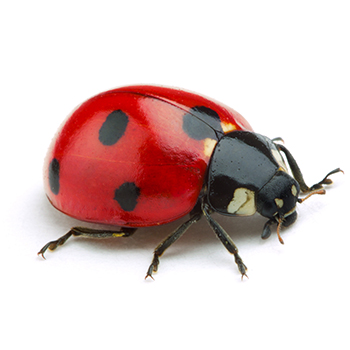New Jersey Ladybug Control

Ladybugs are often seen as harmless insects; however, in New Jersey and other parts of the eastern U.S. a variety of ladybugs called Mexican bean beetles can cause serious damage to plants and crops as they eat the leaves they need for photosynthesis. Also, ladybugs can be a nuisance pest because they can invade your home or business in large numbers, disturbing you, your family, and guests. To protect your New Jersey home or business from ladybugs, you need to learn about the behavior of this pest, take steps for prevention, and find effective treatment options should an infestation occur.
What Are Ladybugs?
Ladybugs are a species of beetles found throughout New Jersey. These pests also go by the name of lady beetles or ladybird beetles. Even though ladybugs are often seen as harmless—and even beneficial—some can overwinter inside your home or business, irritating residents, guests, and customers. There are ladybugs all over the world and around 475 species within North America.
How to Identify Ladybugs
Viking Pest’s certified entomologist, Craig, explains ladybugs are orange, yellow, red, shiny black, or brown in color. Ladybugs usually have markings on the outsides of their shells, and often these are in the form of spots. Several versions of spotted ladybugs can be identified due to having eight spots on each side of their shells. Ladybugs range in size between 1/31 and 3/8 of an inch long. These pests have antennae, and like many other insects, ladybugs have six legs. The bodies may appear round, but they are really oval in shape.
What Problems Can Ladybugs Cause for New Jersey Home and Business Owners?
While most ladybugs are harmless to humans, some can irritate asthma sufferers from the allergen and dust created from expired bodies. In addition to the Mexican bean beetle, the squash beetle, another type of ladybug found in the New Jersey area, also likes to eat leaves. New Jersey pest control experts at Viking Pest explain these bugs could cause damage to plants, fruits, vegetables, and flowers around the property at your home or business.
When Are Ladybugs Active in New Jersey?
New Jersey pest control experts state although ladybugs are active all year long, you are most likely to see them indoors in New Jersey when temperatures drop in the fall and winter. Ladybugs tend to move inside in order to avoid the cold outdoor temperatures.
How to Prevent Ladybugs in New Jersey
One way to prevent ladybugs in New Jersey is to tightly seal up any points of access to your home or business building. For example, the New Jersey pest control experts at Viking Pest recommend fixing any damaged window or door screens is a great way to prevent ladybugs from invading your home or business. You can also try to prevent them from entering your New Jersey business or residence by making sure windows and doors close properly without leaving any gaps ladybugs could try to squeeze through as they search for a warmer environment. The best way to get rid of ladybugs in your New Jersey home or business is to contact the pest control experts at Viking Pest. You can have your home or business professionally inspected. If you have a ladybug infestation, Viking Pest can use an Integrated Pest Management (IPM) system to remedy the issue from the source.
Viking Pest Can Help Control and Prevent Ladybugs in New Jersey
Viking Pest offers expert treatment designed to effectively and efficiently control and prevent ladybugs from invading your home or business in New Jersey. Call Viking today for your FREE and NO OBLIGATION estimate at 1-800-618-2847 or schedule online today!















